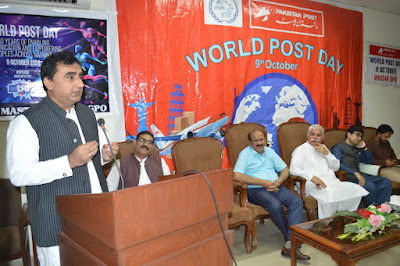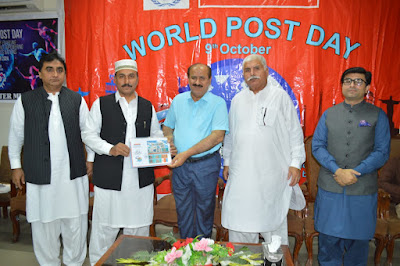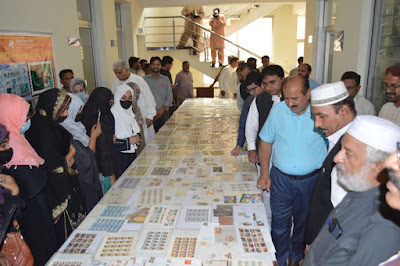Ghulam Ban who won fame as Ban
Aleeg was born at Klannore, District Gurdaspur in undivided India in 1907. Soon
after his birth his parents, alongwith other family members, left Klannore and
settled in Faisalabad (former Lyallpur).
Ghulam Ban received his school
education at Faisalabad and then spent some years in Muslim University Aligarh,
a great seat of learning of the Muslim nation of India, and came to be known as
Ban Aleeg. He was a talented young man.
His stay at Muslim University Al
igarh gave him the passion to do some thing for his country. He was a thinker
and possessed originality and creativity. He was deeply disturbed by the plight
of masses by the colonial masters and their stooges, the feudal lords of India.
Oppression, tyranny, poverty and
exploitation were rampant in India. But the history books portrayed the
colonial masters as liberators, harbingers of light and the benefactors of the
people.
Ban Aleeg was a poor man. He had
no means for realising his dreams. He could think and write but it was not easy
to publish what he wrote. No body, dared to displease the rulers and their
agents.
The parents urged Ban Aleeg to
find a job but he revolted against the restrictions and conditions of service.
For some time he taught in a school at Faisalabad but one day he slipped to
Lahore and it was after a few months that his parents came to know that Ghulam
Ban was working in a newspaper as “Ban Aleeg”.
According to the eastern
tradition bondage of marriage was used to make Ban Aleeg stay at home and stick
to a job. But this, too, did not work. He traveled from place to place to find
a newspaper which could publish what the wrote. He worked in Lahore, Amritsar
and Rangoon at different times and for different newspapers.
He was attracted towards
communism because it opposed imperialism and stood for the soviets (the
masses). He yearned for presenting the Indian history in its true perspective
and he was greatly influenced by the Seerat of the holy prophet of Islam. The
history, Islam and Communism were the main subjects on which he wrote and
talked.
He was a versatile genius ie a
veteran journalist, a prominent researcher and a man of letters. He wrote 13
books mainly on history, communism and Islam. Taarikh Kia Hai (What is history)
Taarikh Ka Mutaalia (The study of history) Inqilaab-i-France (The French
revolution) and company ki Hakoomat (Company’s rule) are his distinguished
works on history. Company Ki Hakoomat (Company’s rule) came to be recognised as
a book of extra-ordinary merit and it played the main role in bringing fame and
troubles to him.
He became famous for presenting
the history of the sub-continent in the true perspective. All the history books
written during the rule of East India Company and afterwards presented the
colonial masters as torch-bearer of civilization, peace and prosperity.
Ban Aleeg presented the facts,
that contradicted many things in other history books. He highlighted the plight
of the people, injustice done to many nobles in the sub-continent. Obviously
this work displeased the colonial rulers. Ban Aleeg had to travel from place to
place and to work in different newspapers for living.
As ardent enemy of imperialism
and colonialism, Ban Aleeg became famous as a progressive writer. He wrote
books on Karl Marx, Lenin and the philosophy of Communism. He remained
associated as editor, editorial writer and columnist with some newspapers
Musawant, Ihsan, Shahbaz, Milap, Partap, Sheri Rangoon & Adb-i-Lateef, were
the main papers for which he worked.
His writings inspired the readers
to struggle against imperialism, oppression and tyranny. His vision was the end
of all types of exploitation and improvement in the life standards of the poor
masses. Because of his thoughts and works Ban Aleeg led a life of extreme
hardship. He lived from hand to mouth.
The persons of much less calibre
were offered attractive positions by the Government or were facilitated by the
pro-government rich people.
Bari Aleeg had a galaxy of
writers around him, most prominent among them was Sa’adat Hasan Manto. In his
words “Bari Aleeg was his guide, his teacher”. He exercised a great impact on
his contemporaries. He introduced a new trend of analyzing the events in a
rational and argumentative way.
His writings paved the way for
“progressive Movement” in literature and journalism. He motivated so many
writers, journalists and poets to crusade against oppression, tyranny social
and economic injustices.
Ban Aleeg was fortunate to
witness the emergence of Pakistan. He hoped that his vision would be realized
and he would also witness a change in the life standards of poor masses. But on
December 10,1949 he had a heart attack and he passed away.
He was buried at Faisalabad where
all his relatives were dwelling. His life was short but it was like the life of
a meteor.
To commemorate the 50th Death Anniversary of the great writer late Ghulam Ban Aleeg Pakistan Post Office is issuing a commemorative postage stamp of Rs 5 denomination on December 10,1999.



















































